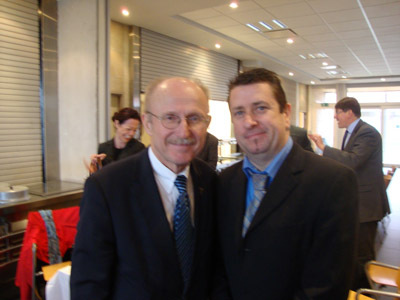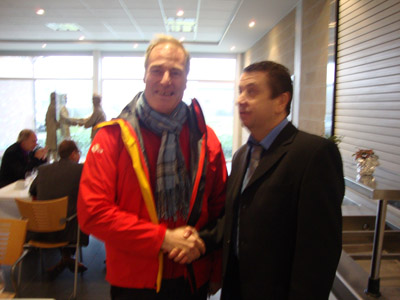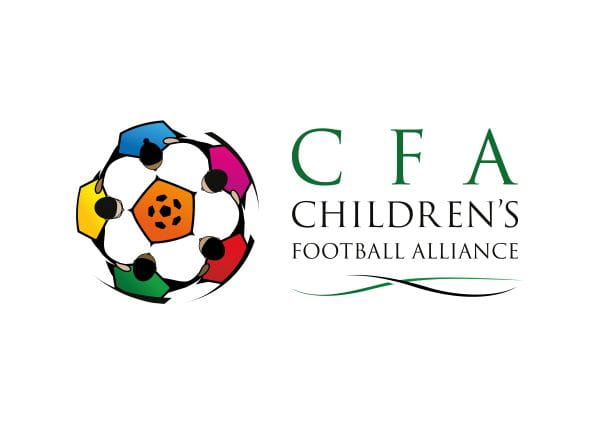
Snapping out of my daydream I was informed by Mr Lemke United Nations Special Advisor on Sport for Development and Peace that he would be available to chat with me after the ceremony and could I remind him that he had agreed to be kidnapped in order to finally do the interview.

On return the International entourage picked up Lord Michael Bates walking from Olympia, Greece to London www.walkfortruce.org Baron Bates decided to walk over 3000 miles in the hope that he can persuade all 193 member states of the United Nations General Assembly to actually implement the Olympic Truce and “pursue initiatives for peace and reconciliation in the spirit of the Ancient Games”.
Ernie Brennan (EB). Mr Lemke you have been working for the Secretary-General now for four years can you tell the NCFA members what is your remit?
Wilfried Lemke (WL). My mandate is that I have to be the representative, an advocate and facilitator of sports.
EB. What does that mean?
WL. We have to use sport as a tool for development and peace all over the world. Normally we look at developing countries in Africa, Asia and South America to change the lives of people in these parts of the world. Sometimes people don’t believe me when I say this but I would like them to join me when I visit poor areas, townships, slums and refugee camps where I can prove that sport changes lives for the better especially for young people.
EB. Why is it necessary for you to support the Christmas Truce Flanders Field Project?
WL. For me, compared to you I am an old man, I was born German in 1946 just some months after the War ended. My mother gave me the name Wilfried which in German language means I want peace. Wil – Want and Fried that means peace in the German language. Stop war. That was the name my mother and father gave me in 46. I have to say right now that we have to stop war. The reality is that thousands of people are killed every week by war.
EB. The significance of the Christmas Truce, what does that mean to you?
WL. It means a great deal. There were some brave bold men that stopped war on a field here in Messines, Belgium. They said stop war when they sang Silent Night in their language sharing a moment in time that will be forever spoken about. It is such a strong moment of humanity and we must never forget it and embrace the message for the future. That is the reason why we will try and use our network in the United Nations to do something positive here and provide the world with a place to respect a moment of humanity through football.
EB. How important is this project for children and what role can they play?
WL. This is very important that children are educated and informed that football was used to stop war and not create war. Children all over the world can learn a lot through football and can relate to the sport’s excitement, fun and friendships made by playing the game. I believe it when football in poorer countries makes a difference to people’s lives, especially young people. I am fortunate to travel the world 200 or so days of the year and see the great work being carried out by organisations like Alive and Kicking There is so much good work happening around the world through football and yet we can still make a difference to peoples’ lives if we support their efforts by working together and not just in our own countries.
The Flanders Peace Field Project will commemorate the historical peace truce in the 1914 Christmas truce. The three pillars: sport, peace and development will engage children from all nations and cultures. It will reach out to different generations and educate everyone that this extraordinary event shows the positive power football can have, even in times of peace initiatives. And that is precisely the starting-point of the Project wants to take when it wants to use football to guide young people from different countries to peace education and sense of community. The role children can play is to be inspired by the event and take that inspiration into their life and to help make the lives of other people better.
EB. You are giving a lecture at the European Parliament, Brussels later about the Christmas Truce. Is there a plan of action to meet the 100th anniversary of getting something in place to ultimately stand as a monument for time immemorial?
WL. I will do my utmost best to make show the United Nations community network knows about the Project and the great work and support being done to achieve the aims of bringing people together in an amazing backdrop here in Messines, Belgium.
EB. On behalf of the National Children’s Football Alliance we look forward to working with the International Community helping to support this fantastic project.
WL. Thank you to the NCFA’s support. Let us hope we can all be in a position to enjoy the long term benefits this project will bring to future generations.
